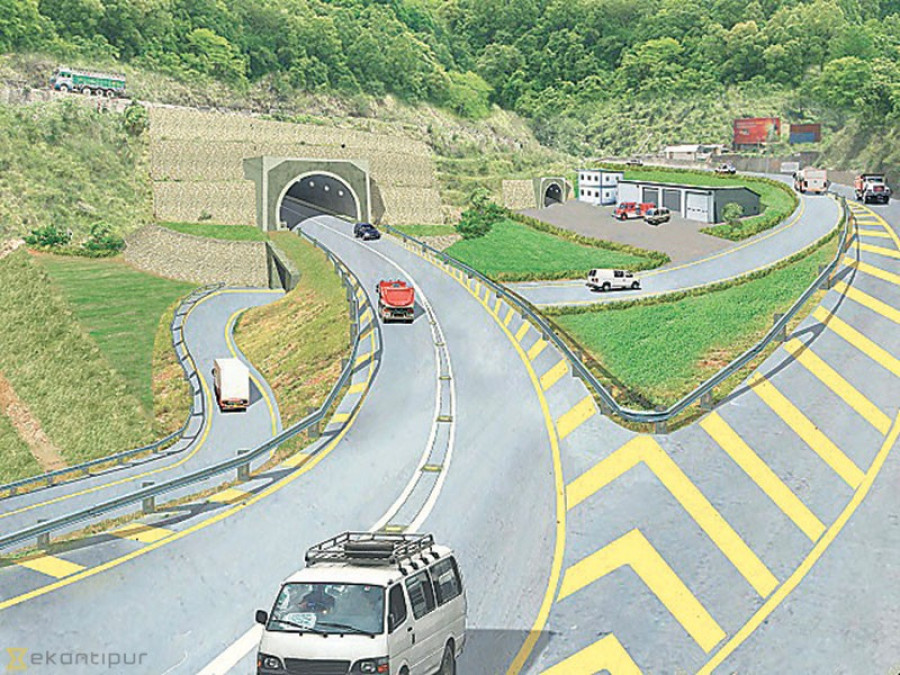National
Project implementation getting tougher due to high compensation cost for land acquisition
Prime Minister Oli expresses concern over growing demand for compensation.
Prithvi Man Shrestha
Nagdhunga-Naubise Tunnel Road Project paid compensation from Rs750,000 to Rs950,000 per anna for the unused land in sloping Thankot in Dhading as it acquired 109 ropanies of land for the project.
It is not that the land was so expensive, but the government had to heed to the demands just to build the first-ever tunnel road project, officials at the Department of Roads said.
After the project paid between Rs 900,000 and Rs4.2 million for the land that lies within the border of Kathmandu district, people in Dhading also started demanding more compensation for their land.
As a result, the project had to pay as much as Rs6.75 billion, nearly a third of the total construction cost of the Tunnel Road. The tunnel project is estimated to cost Rs22 billion.
This compensation paid for land acquisition for this 2.45km-long tunnel project, which connects Nagdhunga in Kathmandu to Sisnekhola in Dhading, has a knock-on effect on another project that has been planned near this project.
The government is preparing to build an 11.2km-long road from Sisnekohola to Dharke, to be used as an alternative road to the current highway, which usually sees heavy traffic.
The government is in discussion with the World Bank on funding for the alternative road although a formal loan negotiation has yet to begin.
"Based on the compensation paid to acquire land for the tunnel project, compensation amount for the Sisnekhola-Dharke road works out to be more than Rs9 billion—three times the project's construction cost," said Arjun Jung Thapa, chief of foreign coordination division at the Department of Roads.
The construction cost of the project is estimated at Rs3 billion for which the World Bank is positive about financing, according to the department.
The Finance Ministry has expressed reservations about developing the new road project after calculating the cost of compensation based on the tunnel project, Thapa said. "But, the ministry has not yet informed us about its decision."
Srikrishna Nepal, chief of the international economic cooperation coordination division at the Finance Ministry, however, said that he was not aware of the latest situation about the project. But he admitted that it is one of the projects where Nepal is seeking assistance from the World Bank.
Officials at the Department of Roads said that implementing the development project has been increasingly costly due to high compensation cost for land acquisition.
The government cannot deny compensation to the landowners after the Supreme Court decision on September 18, 2017. The apex court made it mandatory for the government to compensate people before acquiring their land in the case of expansion of the 9-km Nagdhunga-Kalanki road.
The verdict has had a knock-on effect on other road projects, particularly in road expansion projects in Kathmandu.
Even those who had agreed to give their land for the road expansion in the past, are seeking compensation from the government now, officials say.
Even Prime Minister KP Sharma Oli on Monday expressed concerns over the rising cost for compensation to acquire the land when he inaugurated the 60MW Upper Trishuli 3A project.
"One seeks to pay less tax while selling off property, but seeks high compensation when one has to take it from the government," said Oli.
Stating that a lot of projects have been delayed due to high compensation demand, Oli urged people to consider taking reasonable compensation as per the regulations.
But it's not only the road projects which are facing hurdles due to high compensation demand.
Budhigandaki Hydropower Project is expected to cost around Rs60 billion in compensation for land acquisition and resettlement of households to be affected by the project.
The cost of the 1200MW project is estimated at Rs250 billion, including land acquisition and resettlement. So the project will have to fork out more than 30 percent of the project's total construction cost.
According to Gokarna Raj Pantha, assistant spokesperson for the Ministry of Energy, Water Resources and Irrigation, the government paid at least Rs500,000 per ropani even for a piece of land which would otherwise cost around Rs35,000 per ropani at the market rate. The national pride project had to cough off as much as Rs800,000 per ropani in compensation to acquire land.
"The high compensation compared to the market price is making the project cost go through the roof," said Pantha. "If the private sector is to develop the project, they may be discouraged from investing."
Land acquisition issue has also delayed a number of transmission line projects.
The under-construction 132kV Thankot-Chapagaun-Bhaktapur transmission line, intended to strengthen the Kathmandu Valley's power supply system by eliminating voltage fluctuations and ensuring proper load management, has been a work in progress since 2004.
"The project is in limbo as people are unwilling to sell their land, citing low compensation, despite offering better than the market rate," said Panth.
The same issue delayed the completion of 132 kV Middle Marshyangdi transmission line. Despite starting in 2002, the project came into operation only in 2019.
Officials said that it is high time that the existing land acquisition policy was reviewed to reduce the cost of the compensation.
"Otherwise, it will be very difficult to implement the major infrastructure projects," said Thapa.




 9.89°C Kathmandu
9.89°C Kathmandu














